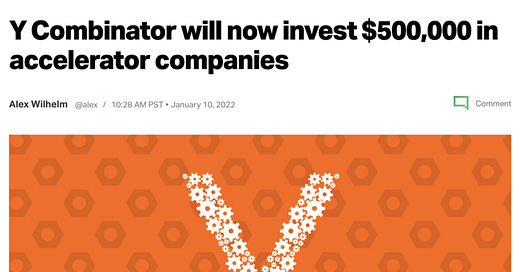The Brand New Alternatives to YC in 2022
Sequoia, a16z, and others are getting into the accelerator game

With YC’s success with Airbnb, Stripe, DoorDash, and others, YC became one of the most popular ways to start a company. By providing advice, brand-name recognition, high-quality access to seed-stage investors, and initial funding — it was a no-brainer to apply to YC.
YC had some competition with Techstars, 500 Startups, Acceleprise, etc., but the competition was very limited. None of them had anywhere near the success of YC. For example, the market cap for all of Techstars companies is only $63B which is less than just one of YC’s most successful companies.
However, when YC announced they would start investing $500k instead of the usual $125k in new startups at the beginning of the year — the gauntlet dropped. Investors that had been feeding at the trough of YC Demo Days for deal flow for the last decade quickly went from being complementary to competitive with the famed accelerator. With the increased investment amount, it was simply harder to get in at the seed-stage valuations they were used to.
Not to be outdone by YC, several top-tier firms have since launched accelerators of their own creating more options for founders. Unlike other accelerators that struggled to develop a brand or a bench of experienced partners, these firms bring those in spades. Whether these accelerators will be successful or not remains to be seen, but I’m optimistic. Here is a rundown of the newly launched accelerators.
Sequoia Arc
In March, the iconic VC firm Sequoia launched their “Arc” program which is “not” an accelerator but it certainly smells like one. They provide $1m in funding, along with advice and help at the earliest stages of company formation using their “Company Design” framework. They are starting with relatively small batches of around 15 companies, but I wouldn’t be surprised if they quickly grow with time. Their original cohort was focused in Europe and they are running a cohort later this year that is US-based.
a16z START
In April, Andreesen-Horowitz announced that their accelerator program was no longer in beta. They offer up to $1m in funding as opposed to a flat $1m like Sequoia and also provide advice for founders at the earliest stages of company building. Unlike Sequoia, applications are rolling so you can apply at any time.
Afore Alpha
In May, up-start VC firm Afore, which was one of the first advocates for the emerging “pre-seed” round a few years ago, announced a program of its own. Unlike Sequoia and a16z though, it lacks the brand name so they are being more aggressive by not only committing $1m, but also stating the valuation will be $10m post-money. Sequoia and a16z make no such claim on the valuation, but I would guess it’s in between YC’s $1.7m and Afore’s $10m valuations. Like a16z START, Afore also accepts applicants on a rolling basis.
Notable mentions
Although these programs aren’t new, here are some other popular alternatives to YC.
Techstars —After YC, the next-most popular accelerator. They often run cohorts with a focus on particular industries which can be beneficial.
500 Startups — Another top accelerator with solid wins under its belt.
Acceleprise — An enterprise-focused accelerator.
Pear Accelerator—A small-batch accelerator led by the famous Pejman.
Hyper—A newer accelerator, backed by a16z + Sequoia.
Summary
With YC’s success with Airbnb, Stripe, DoorDash, and others — YC became one of the most popular ways to start a company. For a long time, YC was the only game in town with little-to-no competition. This allowed YC to have a monopoly in the space and buy pieces of future unicorns at the rock bottom valuation of $1.7m.
However, when YC increased their investment amount from $125k to $500k in January of 2022, this changed the seed-stage dynamics and accelerated (no pun intended) the creation of a new crop of accelerators from top-tier firms. Make sure to check them out if you’re considering applying to YC!






